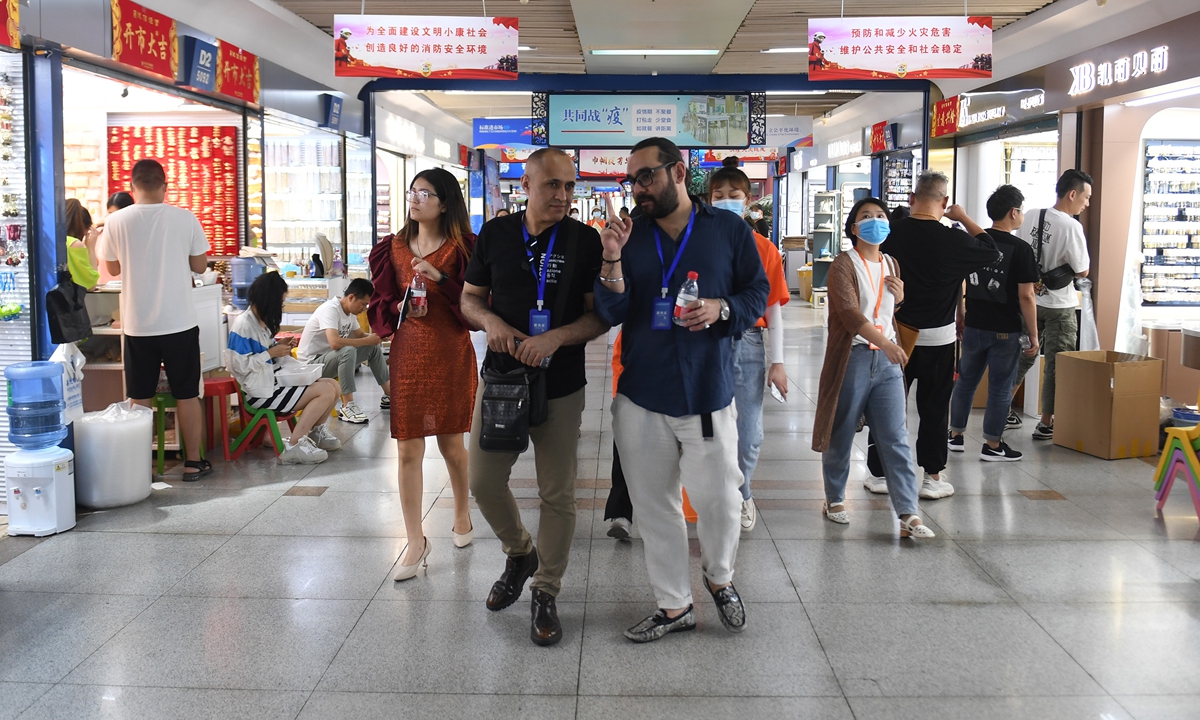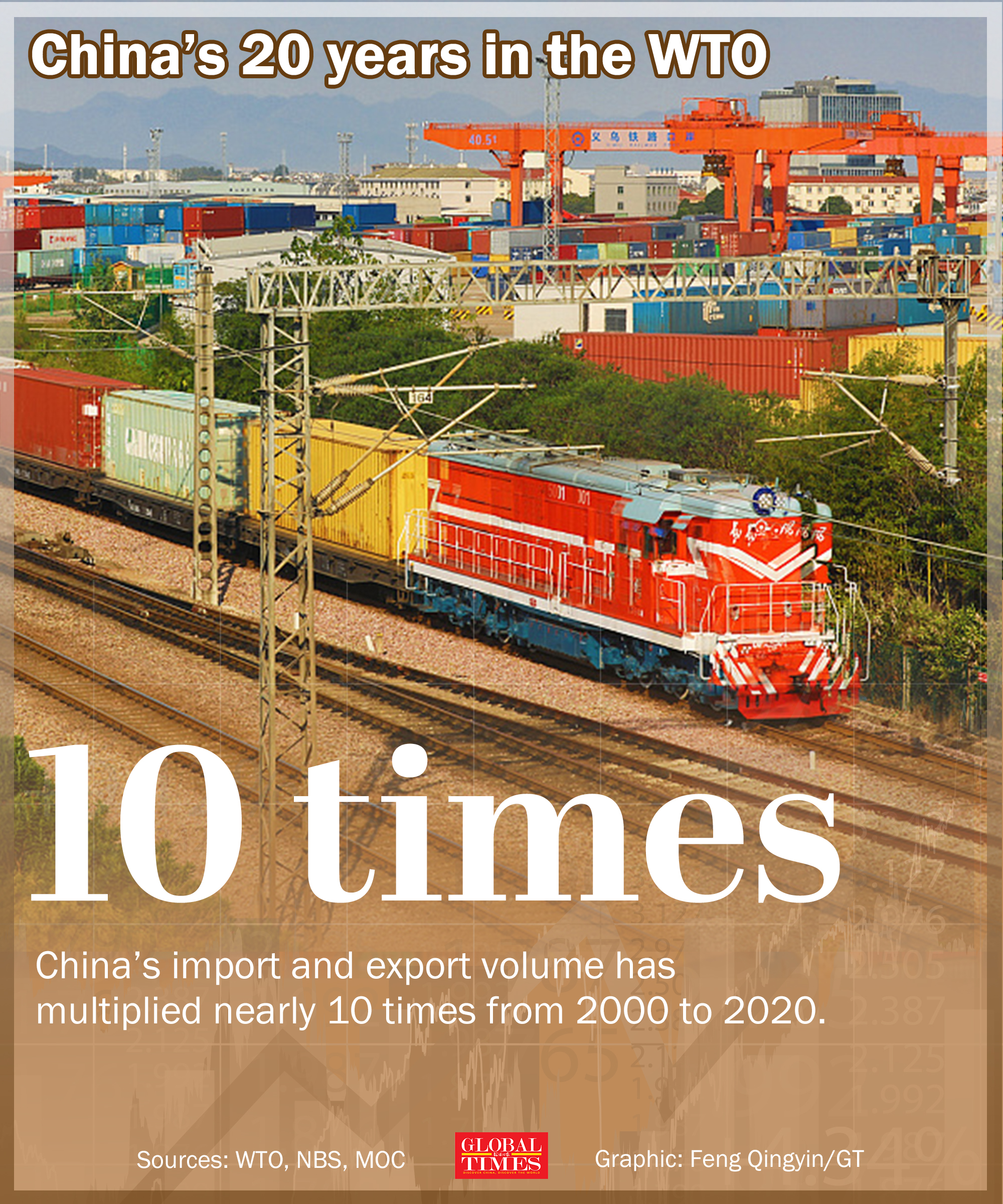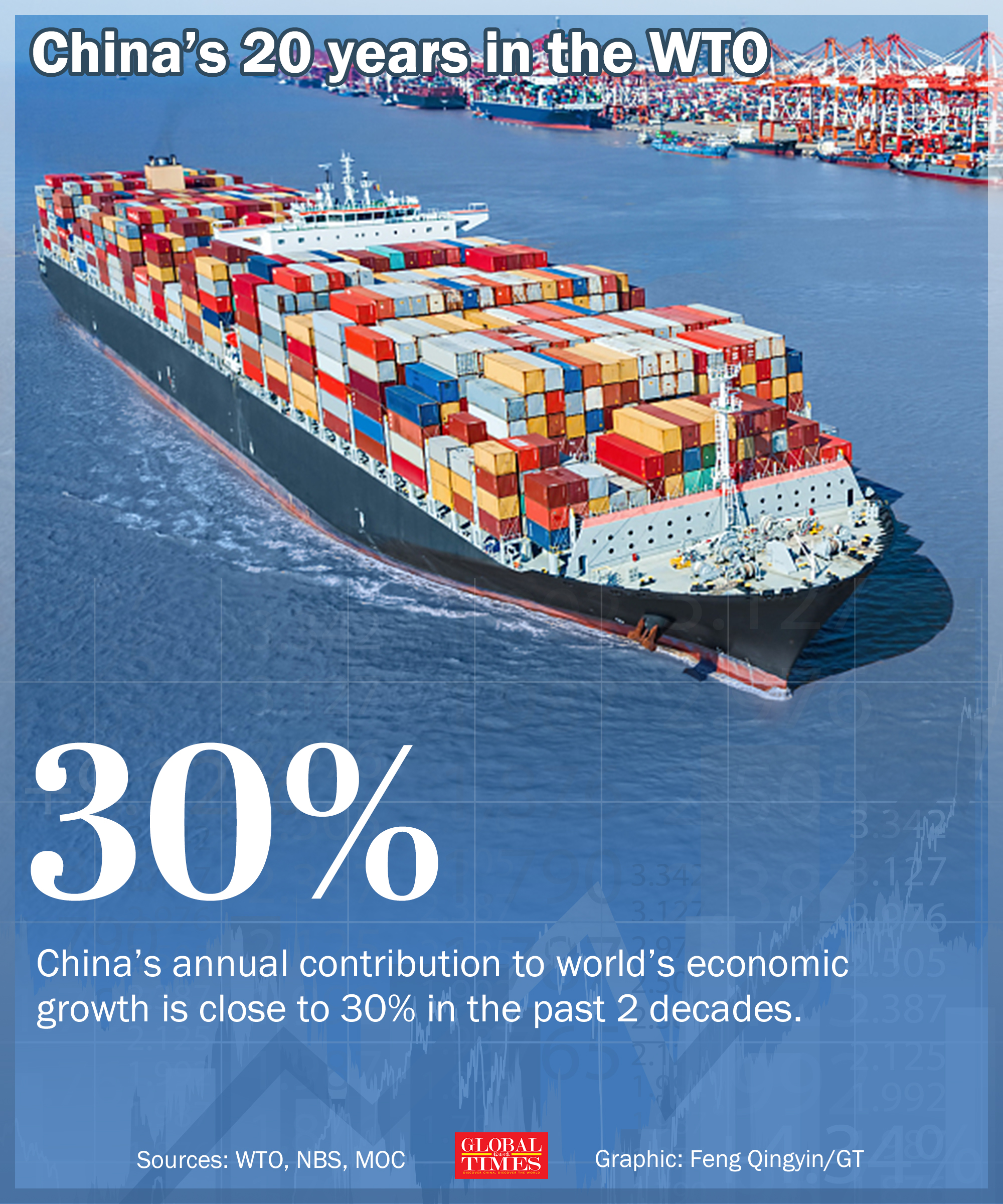

Foreign online celebrities visit the Yiwu International Trade Market in East China's Zhejiang Province on June 7, 2021. Photo: cnsphoto
Even 20 years after China joined the World Trade Organization (WTO), Shi Xinyu, a veteran trader based in Yiwu, China's small commodity hub located in East China's Zhejiang Province, clearly remembers the impact brought by the event on his business.
In 2001 when China joined the WTO, Shi was selling ornaments in South China's Guangzhou through both retail and wholesale channels.
"My impression was that foreigners suddenly swarmed into China to purchase stuff, and overseas orders were swarming in, partially because Chinese products were too good and inexpensive for foreign buyers then," he said.
He still can recall an interesting anecdote at that time, when a client from Turkey asked him via translator about how much the bracelets he was selling cost. "I answered him 0.2. He asked: $0.2? I said 0.2 yuan ($0.03). The translator later told me: if you say $0.2, it's absolutely OK with the client."
Back in his hometown of Yiwu, going into the trade business also become a popular path for locals. "When I asked what my friends did, around seven out of 10 said they were in the trade business," he said. "It seemed strange if one did not have several foreign friends at that time."
Shi's anecdotes are a window into the changes which took place in China after the country joined the WTO. For cities like Yiwu, although being part of the WTO might not be the start of their journey in developing from a backward town into a modern trade hub, it was definitely an accelerator for the transformation.
Currently, even with challenges like the coronavirus, China's foreign trade remains resilient and dynamic. In November, China's exports surged 22 percent in US dollar terms on a yearly basis, while imports rose by 31.7 percent, according to data published by Chinese customs on Tuesday.

China's 20 years in the WTO Graphic: Feng Qingyin/GT
Learn and grow Joining the WTO was a milestone event in the development of China's overseas trade-led economy, and it provided significant momentum for the government to implement reforms on trade rules that helped Chinese goods meet standards in overseas markets.
According to a report by the People's Daily in 2005, China fulfilled most of its WTO obligations in only four years after joining the body. The reforms included relaxing foreign trade management rights and cutting import tariffs. By the end of 2005, China's average tariff level dropped to 9.9 percent from 15.3 percent before 2001. China also scrapped import quotas and certificate management requirements for hundreds of products.
The impact of the reforms on transforming Chinese cities was obvious for all to see.
"The city of Yiwu is a typical example of benefitting from WTO entry, as it developed from a town in the mountains to a global trading hub. Guangzhou and Shanghai were considered export-oriented cities, but the WTO entry enhanced their strengths and become the regional headquarters for many international companies," Zheng Lei, chief economist at Glory Sun Financial Group, told the Global Times.
Many costal Chinese cities have evolved to embrace the shift towards manufacturing centers, such as Shenzhen, Hangzhou, Ningbo and Dongguan. "In fact, half of China's economic output after 2000 had something to do with the WTO access," Zheng said.
For businessmen, the most tangible benefit brought by the WTO entry is that they had more orders from overseas markets. Zhang Jiying, a veteran umbrella seller in Yiwu who has been trading since 1998, said she sensed an "evident increase" in overseas clients after China joined the WTO.
"When I first started business, my clients were mostly from Pakistan and Afghanistan. But around 2005, European clients started to increase. Also, the procedures of dealing with overseas clients became simpler after China's entry to the WTO," she told the Global Times.
Shi said that in the first few years after China joined the WTO, it was very common to run into foreign buyers in Yiwu. Many overseas clients came to explore centralized procurement, and they would purchase thousands of products at once.

China's 20 years in the WTO Graphic: Feng Qingyin/GT
From exports to imports Over the years, China has taken managed steps to open up its market after 2001, and the reforms have also helped transform Yiwu, turning the city into an all-around trade center with imports and exports both thriving.
According to Zhang, her business was at its peak around 2014, boosted by the growth of clients from many countries.
"Because China initiated the Belt and Road Initiative (BRI) in 2013, trade with countries along the route was growing fast. My company saw rising orders from countries like Russia and Ukraine. I feel that China's access to the WTO complemented the BRI very well," she said.
Entry to the WTO also boosted China's imports, which experts said not only drives economic growth for trading partners, but also helped stablize global commodity prices.
"In particular, China has become a major consumer in bulk commodities like ores and agricultural produce, which brought staggering benefits to countries like Brazil and Australia," Zheng said.
Yiwu's imports business just exploded on this wave of new market access. In 2008, the Yiwu International Trade City opened its imports hall, and Shi's shop, which sells furniture and handicraft, was among the first group of merchants to enter the new business.
"When I started the import business, many of the products I imported had never been inspected by customs, and officials then were confused about import standards. For example, they hesitated over whether to define my handicraft lamps as electric appliances or as craft goods. If they were defined as electric appliances, they must meet the government's 3C certificates, which is very hard for a Vietnam manufacturer. But luckily officials were pragmatic and solved the problem in the most appropriate way," Shi said.
He also noted that as China's imports industry has become increasingly mature, lists of imports also grew to be more standardized. Currently, there are hundreds of import companies based in the Yiwu International Trade City.
Through the years of development, the role of Yiwu as global small commodity trade hub has been strengthened to such an extent that it can support global supply chains in difficult times such as the coronavirus pandemic.
In the first seven months of 2021, Yiwu's trade volume hit 200 billion yuan, up 17.8 percent year-on-year, Yiwu customs data showed.
Local businesspeople told the Global Times that although their business has taken some hits from the pandemic, they still have confidence in the city's future development prospects.
"I feel honored to witness the development of Yiwu after joining the WTO. Although it's not convenient for overseas businesspeople to visit China now because of the pandemic, I believe clients will continue to come to Yiwu after domestic and global situation becomes more stable," Zhang said.







